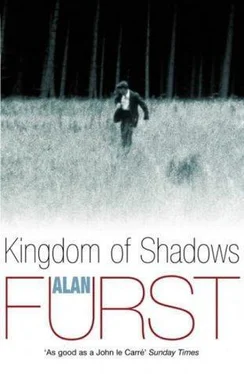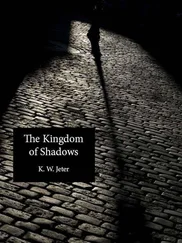Alan Furst - Kingdom of Shadows
Здесь есть возможность читать онлайн «Alan Furst - Kingdom of Shadows» весь текст электронной книги совершенно бесплатно (целиком полную версию без сокращений). В некоторых случаях можно слушать аудио, скачать через торрент в формате fb2 и присутствует краткое содержание. Жанр: Шпионский детектив, на английском языке. Описание произведения, (предисловие) а так же отзывы посетителей доступны на портале библиотеки ЛибКат.
- Название:Kingdom of Shadows
- Автор:
- Жанр:
- Год:неизвестен
- ISBN:нет данных
- Рейтинг книги:5 / 5. Голосов: 1
-
Избранное:Добавить в избранное
- Отзывы:
-
Ваша оценка:
- 100
- 1
- 2
- 3
- 4
- 5
Kingdom of Shadows: краткое содержание, описание и аннотация
Предлагаем к чтению аннотацию, описание, краткое содержание или предисловие (зависит от того, что написал сам автор книги «Kingdom of Shadows»). Если вы не нашли необходимую информацию о книге — напишите в комментариях, мы постараемся отыскать её.
Kingdom of Shadows — читать онлайн бесплатно полную книгу (весь текст) целиком
Ниже представлен текст книги, разбитый по страницам. Система сохранения места последней прочитанной страницы, позволяет с удобством читать онлайн бесплатно книгу «Kingdom of Shadows», без необходимости каждый раз заново искать на чём Вы остановились. Поставьте закладку, и сможете в любой момент перейти на страницу, на которой закончили чтение.
Интервал:
Закладка:
Afterward, they went to the tearoom of the Hotel Gellert and had acacia honey and whipped cream on toasted cake.
3:30 in the morning. In the rambling, iron-gated gardens of the villa district, some people kept nightingales. Other than that, he could hear wind in the autumn leaves, a creak in a shutter, a neighbor’s fountain, a distant rumble of thunder-north, he thought, in the mountains.
Still, it was hard to sleep. Morath lay in his old bed and read Freya Stark-this was the third time he’d started it, a travel narrative, adventures in the wild mountain valleys of Persia.
He’d always stayed up late in this house, his father’s very own son. He used to hear him, sometimes, pacing around the living room. Often he played records on the Victrola while he worked in his office-sliding stamps into glassine envelopes with a silver tweezers.
They weren’t rich, but his father never worked for money. He had been one of the great philatelists of Hungary, very strong in both nineteenth-century Europe and colonials. Morath supposed his father had traded in the international markets, perhaps he’d made some money that way. Then, too, before the war, nobody really had to work. At least, nobody they knew.
But, after Trianon, everything changed. Families lost the income they’d had from land in the countryside. Even so, most of them managed, they simply had to learn to improvise. It became fashionable to say things like “If only I could afford to live the way I live.”
Then, on a June day in 1919, the communists killed his father.
In the spasms of political chaos that followed the loss of the war, there came a Soviet Republic of Hungary-a government born of a national desperation so deluded it persuaded itself that Lenin and the Red Army would save them from their enemies, the Serbs and the Roumanians.
The Soviet was led by a Hungarian journalist named Bela Kun who, while serving in the Austro-Hungarian army, had deserted to the Russians during the war. Kun, his henchman Szamuelly, and forty-five commissars began a rule of one hundred and thirty-three days, and shot and burned and hanged their way from one end of Hungary to the other. They were then chased out of the country-across the border and, eventually, into the Lubianka-by a Roumanian army, which occupied Budapest, wandered aimlessly about the countryside, and spent its days in desultory looting until it was shooed back across the border by a Hungarian army, led by Miklos Horthy. The counterrevolution then gave birth to the White Terror, which shot and burned and hanged its way from one end of Hungary to the other, paying particular attention to the Jews, since Jews were Bolsheviks (or bankers), and Kun and a number of his comrades were Jewish.
It was one of Kun’s wandering bands that murdered Morath’s father. He had gone, one weekend, to the country house in the Carpathian foothills. The communist militia rode into the yard at dusk, demanded jewelry for the oppressed masses, then bloodied the farm manager’s nose, threw Morath’s father into a horse trough, took three stamp albums-1910 commemoratives from Luxembourg-all the cash they could find, several shirts, and a lamp. They chased the servant girls into the woods but couldn’t catch them and, in one corner of the kitchen, set a fire, which burned a hole in the pantry wall and went out.
Morath’s father dried himself off, calmed the servant girls, put a cold spoon on old Tibor’s neck to stop the bleeding, then poured a small glass of plum brandy and sat down in his favorite chair, where, with his glasses folded up and held gently in one hand, he died.
Morath went to his sister’s house for dinner. A new villa, also in the Third District but up in the newly elegant quarter known as Rose Hill. His sister, in a low-cut dress and red felt boots with tiny mirrors on them-oh, Cara-gave him a sexy hug and a warm kiss on the lips. “I’m so happy to see you, Nicholas. I am.” She didn’t let him go until a maid came into the room.
This was not new. She was three years older than Morath. When he was nine and she was twelve, she liked to comb his hair, would slip into his bed during a scary thunderstorm, would always know when he was melancholy and be tender to him.
“Teresa,” he said. “My only love.” They both laughed.
Morath looked around. There was too much furniture in the Duchazy house, much too expensive and much too new. How his sister could have married that idiot Duchazy was beyond him. They had three children, including a ten-year-old Nicholas-the absolute image of that idiot Duchazy.
Still, Teresa had married him, and her days of worrying about money were long over. The Duchazy family owned flour mills-thirty years earlier there’d been more mills in Budapest than in any other city in the world. Morath’s mother, who disliked Duchazy even more than he did, would refer to him in private as “the miller.”
Not the typical miller. He strode toward Morath and embraced him. He was a sinewy man with uncomfortably stiff posture, a pencil mustache, and strange, pale-green eyes. Well then, how was Paris? Still in the advertising business? Still a bachelor? What a life! The children were brought out, shown off, and put away. Duchazy poured brandies and had the fire lit.
The conversation wandered here and there. The Duchazy family was not exactly nyilas but close enough. Teresa warned him with a glance, more than once, when he was headed into a sensitive area. By the end of the second brandy, Duchazy had thrown a second log on the fire, which blazed merrily in a newly installed surround of yellow tile.
“Janos Polanyi thinks Mother ought to leave Budapest,” Morath said.
“Why is that?” Duchazy was annoyed.
“War,” Morath said.
Teresa shrugged. “She won’t go.”
“Maybe if you two considered it, she might.”
“But we won’t,” Duchazy said. “We’re patriots. Besides, I think it’s going to go on this way for a long time.” He meant diplomacy, marches, street fighting-the sort of thing they’d seen in the Sudetenland. “Hitler means to dominate the Balkans,” he continued. “Someone’s going to, it might as well be him. And he wants it quiet in Hungary and south of here-that’s the granary, and the oil fields. I don’t think the British dare to fight him, but, if it comes to that, he’ll need the wheat and the oil. Anyhow, if we’re smart, we’ll stay in his good graces, because the borders are going to start moving.”
“They already are,” Teresa said.
That was true. Hungary, having supported the occupation of the Sudetenland, was to be rewarded with the return of some of its northern territory, especially in lower Slovakia, where the population was eighty-five percent Magyar.
“Laszlo’s brother is fighting up in Ruthenia,” Teresa said.
Morath found this puzzling. Duchazy gave his wife the look that meant you’ve been indiscreet.
“Really?” Morath said.
Duchazy shrugged. “Nothing’s secret around here.” He meant, Morath thought, the house, Budapest, the nation itself.
“In Ruthenia?”
“Near Uzhorod. We’re in it with the Poles. They have irregulars, in the north, and we have the Rongyos Garda.” The Ragged Guard.
“What’s that? ”
“Arrow Cross men, the street-corner boys and what have you, led by a few army officers in civilian clothing. They’re fighting the Sich, the Ukrainian militia. The next thing is, local Hungarians demand an end to the instability, and we send in the regular army. This used to be Hungary, after all, why should it belong to the Czechs?”
Jackals, Morath thought. Now that the prey was down they’d tear off a piece for themselves.
“The world’s changing,” Duchazy said. His eyes sparkled. “And about time.”
Читать дальшеИнтервал:
Закладка:
Похожие книги на «Kingdom of Shadows»
Представляем Вашему вниманию похожие книги на «Kingdom of Shadows» списком для выбора. Мы отобрали схожую по названию и смыслу литературу в надежде предоставить читателям больше вариантов отыскать новые, интересные, ещё непрочитанные произведения.
Обсуждение, отзывы о книге «Kingdom of Shadows» и просто собственные мнения читателей. Оставьте ваши комментарии, напишите, что Вы думаете о произведении, его смысле или главных героях. Укажите что конкретно понравилось, а что нет, и почему Вы так считаете.












